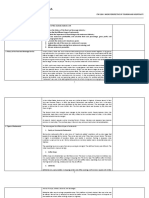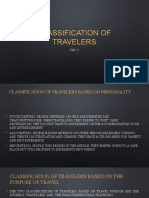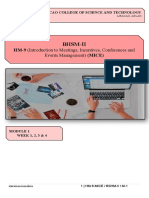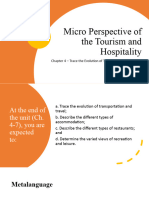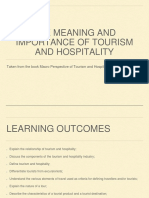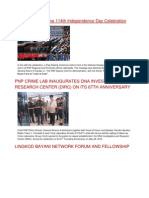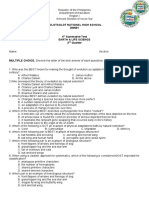100%(1)100% found this document useful (1 vote)
3K viewsEmployment Opportunities and Qualifications in The Tourism and
Employment Opportunities and Qualifications in The Tourism and
Uploaded by
Mariane Joy BustamanteThis document describes various career opportunities within the airline industry. It discusses jobs like flight attendants, ticket agents, reservation agents, ramp agents, baggage handlers, food service workers, dispatchers, sales managers, lounge receptionists, gate agents, and more. For each role, it provides details on typical responsibilities and qualifications. The document aims to inform readers on the wide range of employment available within the transportation sector.
Copyright:
© All Rights Reserved
Available Formats
Download as PPTX, PDF, TXT or read online from Scribd
Employment Opportunities and Qualifications in The Tourism and
Employment Opportunities and Qualifications in The Tourism and
Uploaded by
Mariane Joy Bustamante100%(1)100% found this document useful (1 vote)
3K views73 pagesThis document describes various career opportunities within the airline industry. It discusses jobs like flight attendants, ticket agents, reservation agents, ramp agents, baggage handlers, food service workers, dispatchers, sales managers, lounge receptionists, gate agents, and more. For each role, it provides details on typical responsibilities and qualifications. The document aims to inform readers on the wide range of employment available within the transportation sector.
Original Description:
listed here are the opportunities of employment when you are a Hospitality and Tourism graduate
Original Title
EMPLOYMENT OPPORTUNITIES AND QUALIFICATIONS IN THE TOURISM AND
Copyright
© © All Rights Reserved
Available Formats
PPTX, PDF, TXT or read online from Scribd
Share this document
Read this document in other languages
Did you find this document useful?
Is this content inappropriate?
This document describes various career opportunities within the airline industry. It discusses jobs like flight attendants, ticket agents, reservation agents, ramp agents, baggage handlers, food service workers, dispatchers, sales managers, lounge receptionists, gate agents, and more. For each role, it provides details on typical responsibilities and qualifications. The document aims to inform readers on the wide range of employment available within the transportation sector.
Copyright:
© All Rights Reserved
Available Formats
Download as PPTX, PDF, TXT or read online from Scribd
Download as pptx, pdf, or txt
100%(1)100% found this document useful (1 vote)
3K views73 pagesEmployment Opportunities and Qualifications in The Tourism and
Employment Opportunities and Qualifications in The Tourism and
Uploaded by
Mariane Joy BustamanteThis document describes various career opportunities within the airline industry. It discusses jobs like flight attendants, ticket agents, reservation agents, ramp agents, baggage handlers, food service workers, dispatchers, sales managers, lounge receptionists, gate agents, and more. For each role, it provides details on typical responsibilities and qualifications. The document aims to inform readers on the wide range of employment available within the transportation sector.
Copyright:
© All Rights Reserved
Available Formats
Download as PPTX, PDF, TXT or read online from Scribd
Download as pptx, pdf, or txt
You are on page 1of 73
EMPLOYMENT OPPORTUNITIES
AND QUALIFICATIONS IN THE
TOURISM AND HOSPITALITY
INDUSTRY
CHAPTER 15
LEARNING OUTCOMES
At the end of this chapter, you should be able to:
1. Describe the available jobs in the airline industry;
2. Discuss the employment opportunities in hotels and motels;
3. Clarify the career opportunities in the travel agency;
4. Explain the job opportunities in the cruise line industry;
5. Be familiar with the available jobs in motor coaches;
6. Describe the career fields in the car rental industry; and
7. Explain the employment opportunities in the gaming and
entertainment industry.
EMPLOYMENT OPPORTUNITIES IN
TOURISM
At present, tourism ahs acquired the distinction of being
one of the largest industries. It consists of many
components such as transportation, accommodations,
food service, tourist destinations, tourist attractions,
travel brokers, as well as travel- related services.
Since tourism is a diverse and complex industry, each
sector offers several career and employment
opportunities.
AIRLINES
AIRLINES
Airline employment is exciting and attractive to the
adventurous, whether in the air on the ground servicing
the carriers between flights. Salary levels are relatively
high in the airlines. Short- term economic stresses may
cause some problems, but long- term prospects for
airline careers are bright.
Some of the jobs in the airline are flight attendants,
ticket agents, reservation agents, clerks, airline food
service jobs, flight dispatcher, station ramp agents, sales
managers, airline lounge receptionist, airline flight
attendant supervisors, ramp flight attendants, crew
schedulers, flight crew time clerks, flight reservation
managers, gate agents, gate services supervisors, ground
hosts or hostesses, passenger service representatives,
aircraft log clerks, airport attendants, airport managers,
station managers, chief airport guides, and traffic
agents.
A. FLIGHT ATTENDANT
The position of flight attendant has evolved from the
career that was once called “stewardess”, “hostess”, or
“steward”. In the past, employees who filled this
position were young, female, unmarried, attractive, and
required to be nurses. After a lawsuit filed by a young
man claiming he was denied a steward position because
of his sex, the airlines had to consider both men and
women for the position, thus the evolution of the flight
attendant.
The primary responsibility of the flight attendant is to
see to it that the passengers are comfortable. Travellers
often form their impressions of the airline_ whether
positive or negative_ on their experiences with the flight
attendant.
The flight attendant performs several personal services
conducive to the safety and comfort of airline
passengers during flight, greet passengers, verifies
tickets, records destinations and assigns seats, explains
use of safety belts, oxygen masks, and life jackets, and
serves previously prepared meals and beverages.
The work of a flight attendant is demanding and tiring.
And now, they are no longer required to be unmarried.
Excellent English language is required in this job
position.
B. TICKET AGENTS, RESERVATION AGENTS,
CLERKS
Reservation agents and clerks who work for major
carriers work in large central office where they become
the link between telephone inquiries and the computer
terminal. The agents answer questions on flight
schedules and seat availability and make reservations.
Their work brings them in telephone contact with the
general public, travel agents, as well as their own
company’s ticket agents.
Ticket agents work at airport ticket counters and in
central city ticket offices. Their duties include
answering questions about fares and schedules, handing
out timetables and literature, checking with the
reservation agent on seat availability and selling tickets.
In addition, they check baggage, add excess weight
charges if necessary, and issue boarding passes. Ticket
agents are in direct contact with the public. Thus, they
must be pleasant and present a professional appearance.
They wear uniforms that represent their carrier employer.
Possibilities of advancement to other positions are
improved if one has college- level courses in traffic
management and other phases of transportation.
C. AIRLINE FOOD SERVICE
This is a behind the scene position but an essential
one in the airline industry. Airlines has finally
recognized the need for quality meals to attract potential
passengers. Travellers now expect a meal on board or at
least a snack if the flight is short. Many airlines even
plan international meals characteristic of the destination
or of the airline itself. An airline may have its own food
service division or arrange for a private catering service
to prepare in- flight meals.
D. FLIGHT DISPATCHER
The flight dispatcher gives permission for aircraft of
specific airlines to take off. For example, PAL’s flight
dispatcher oversees all PAL carriers at a given airport.
The dispatchers all factors of the flight including the
airline’s status, the crew, weather information, and other
details. Constant communication between the dispatcher
and crew keeps the crew informed of any delays at the
airport caused by weather or crowded airspace
conditions.
E. OPERATION AGENTS, STATION RAMP AGENTS
The responsibilities of operations and station ramp
agents are the supervision and loading of baggage and
cargo. Cargo weigh must be evenly distributed by these
agents with the corresponding list of members and
passengers recorded. They coordinate the transfer of
baggage for connecting flights while taking on new
luggage at stopover airports. These agents are also
responsible for announcing arrivals and departures.
F. SALES MAANGER/ DISTRICT SALES
MANAGER
Sales managers and district sales manager oversee
ticket and reservation offices, supervise sales
representatives, and promote traffic on their airlines.
They maintain contact with local travel agents and tour
operators to keep them informed on the latest airline
promotions. Their relationship often means discount to
the travel agents or operators for their clients. However,
the sales manager will maintain a profit for the airline
on the basis of volume in these cases.
G. AIRLINES LOUNGE RECEPTIONIST
The airline receptionist admits members and guest to
the airline lounge, serves beverages and snacks; opens
the door to the lounge in response to the sound of a
buzzer; verifies membership cards; admits and seats
members and guests; answers questions regarding
scheduled flights and terminal facilities; and verifies
passenger reservations.
H. FLIGHT ATTENDANT SUPERVISOR
The flight attendant supervisor supervises and
coordinates activities of flight attendants, assigns duties
and areas of work to flight attendants; observes
activities of employees to evaluate works performance
and maintains personal records; explains and
demonstrates methods and procedures for performing
tasks; and prepares evaluation reports on the
performance of employee.
I. RAMP FLIGHT ATTENDNAT
The ramp flight attendant checks flight attendant’s
conformity to personal appearance standards and
performance of pre-flight duties during the boarding
stage of scheduled airline flights and compiles reports
of findings; and inspects appearance and grooming of
personnel for conformity to company standards.
J. CREW SCHEDULER
The crew scheduler compiles duty rosters of flight
crews and maintains records of crew member’s flying
time; schedules airline flights; prepares flight register
which crew members sign to indicate their preference
and availability for flights and time they wish to be
called before each flight; types names of crew members
in the flight schedule in the order of seniority to indicate
flights to crew members are assigned, posts names of
extra crew members in the order of seniority on reserve
list, and selects replacement when needed.
K. FLIGHT-CREW-TIME CLERK
The flight-crew-time clerk compiles flight tome
records of flight officers for the payroll and crew
scheduling departments to ensure accuracy of payroll
and legality of flights and posts data such as time in
flight, type of aircraft, mileage flown, weight of aircraft,
and flight time records using posting machines.
L. FLIGHTS RESERVATIONS MANAGER
The flight reservations manager directs and
coordinates, through subordinate supervisory personnel,
flight reservation activities for certified commercial or
transport companies; reviews flight reservation reports;
and conducts comparative studies with other airline
reservations to develop methods and procedures
designed to improve operating efficiency and increase
reservations for company flights.
M. GATE AGENT
The gate agent assists passengers and checks flight
tickets at entrance gates or stations when boarding or
disembarking airplanes of commercial airlines and
examines passenger tickets to ensure that passengers
have the correct flights or seats or direct passengers to
correct boarding areas, using passenger manifests,
seating charts, and flight schedules.
N. GATE SERVICES SUPERVISOR
The gate services supervisor supervises and
coordinates activities of workers engaged in admitting
departing passengers to the aircraft and assisting
passengers to disembark at terminal exits of commercial
airlines; reviews flight schedules, and passenger
manifests observes workers to ensure that services to
passengers are performed courteously and correctly.
O. GROUND HOST/ HOSTESS
The ground host or hostess renders personal services
to passengers in airline terminals to facilitate movement
of passengers through terminals and create goodwill,
greets, and welcomes passengers to the terminals;
answers questions and advises passengers concerning
flight schedules and accommodations such as arrival or
departure time, location of concourses, and gates
selection of seats on aircraft; assembles and forwards
luggage to departing flights; guides and escorts foreign-
speaking passengers to designated gates for boarding of
aircraft.
P. PASSENGER SERVICE REPRESENTATIVE
The passenger service representative renders a variety
of personal services to airline passengers requiring other
than normal services, such as taking care of company
officials, distinguished persons, foreign- speaking
passengers, invalids, and unaccompanied children;
greets and escorts distinguished persons to lounges or
waiting areas, transports special passengers between
lobby and boarding areas, suing electric carts; gives aid
to sick or injured passengers and obtains medical
assistance, assists elderly persons and unaccompanied
children in claiming personal belongings and baggage;
prepares baby food for mothers with infant.
Q. RESERVATIONS AGENT
The reservations agent makes and confirms
reservations and routing for passengers in scheduled
airline flights; arranges reservations and routing for
passengers at the request of ticket agents or customers,
using timetables, airline manuals, reference guides, and
tariff books; types requested flight number on keyboard
of online computer reservation systems and scans
screens to determine space availability; telephones
customers or ticker agents to advise changes in flight
plans or to cancel or confirm reservations.
R. SENIOR RESERVATIONS AGENT
He supervises and coordinates activities of workers engaged in
reserving seat space for passengers on schedules airline flights;
assigns workers to tasks in accordance with abilities and personnel
requirements; observes work procedures, monitors telephone calls’
and reviews completed work to ensure adherence to quality and
efficiency standards and to rules and regulations; writes revisions to
procedure guides and memoranda describing changes in reservations
methods flights schedules, and rates; records teletypewriter messages
and telephones passenger service personnel to obtain information
regarding flight cancellations and schedule changes and to determine
disposition of passengers holding reservations on cancelled or
rescheduled flights.
S. TICKETING CLERK
The ticketing clerk compiles and records information
to assemble airline tickets for transmittal or mailing to
passengers; reads coded data on booking card to
ascertain destination, carrier, flight number, type of
accommodation, and en route stopovers; selects ticket
blank, invoice, and customer account card; compiles
computes, and records identification and fare data using
tariff manuals, rate tables, flight schedule, and pen or
ticket imprinter; separates and files copies of completed
tickets; clips completed tickets and invoices to booking
cards and routes to other workers for teletype
transmittal or mails tickets to customers.
T. AIRCRAFT LOG CLERK
They keeps records of usage and time intervals
between inspection and maintenance of designated
airplane parts; compiles data from flight schedules;
computes and posts amount of rime airplanes and
individual parts are in use daily calculating machines,
maintains card files for individual parts with notations
of time used and facts taken from inspection records;
notifies inspection department when pars and airplanes
approach date for inspection including accumulated
time and routing schedules.
U. AIRPORT ATTENDANT
The airport attendant periodically inspects buildings
and hangars to detect fire hazards and violations of
airport regulations; examines fire fighting equipment to
detect malfunction and fills depletes fire extinguishers;
performs minor repairs on fire trucks and tractors;
patrols airfield to ensure security of aircraft and
facilities; records airport data such as the number of
planes stored in hangars, plane landings and departures,
and number of passengers carried on planes.
V. FLIGHT INFORMATION EXPEDITER
The flight expediter determines flight times of airplanes
and transmits information to flight operations and Air Traffic
Command Centres; evaluates data, such as weather
conditions, flight plans, ramp delays, and en route stop overs
to determine arrival and departure times for each flight using
aids such as weather charts, slide rule, and computer;
transmits identity and type of airplane, flight locations, time
of arrival and departure, and names of crew members to
obtain clearance for flight over restricted areas; notifies
relevant departments of airlines pending arrival of inbound
flight to ensure that personnel are available to load or unload
fuel, baggage, and cargo.
W. AIRPORT MANAGER
The airport manager plans, directs, and coordinates,
through subordinate personnel, activities concerned
with construction and maintenance of airport facilities
and operation of airport in accordance with
governmental agency or commission policies and
regulations; consults with commission members,
government officials or representatives of airlines to
discuss and plan such maters as design and development
of airport facilities, formulating of operating rules,
regulations, and procedures of aircraft landing, taxiing
and take-off patterns fro various types of aircraft;
Negotiates with representatives of airlines, utility
companies, or individuals for acquisitions of property for
development of airport, lease of airport buildings and
facilities, or use f rights- of- ay over private property;
inspects airport facilities such as runways, buildings,
beacons and lighting, automotive or construction
equipment; formulates procedures to be used in case of
aircraft accidents, fire, and other emergencies.
The airport manager coordinates activities of personnel
involved in the repair and maintenance of airport
facilities, buildings and equipment to minimize
interruption of airport operations; direct personnel's in
instigating violations of aerial or ground traffic
regulations; reviews investigation reports; and initiates
actions to be taken against violators.
X. STATION MANAGER
The station manager directs and coordinates airlines station
activities at transport stations located at airports to provide
services for scheduled flight operations; reviews station activity
reports to ascertain data required for planning station operations;
directs preparation of work schedules to obtain maximum
utilization of manpower and facilities; coordinates activities of
passenger reservations and ticketing, passenger services, ramp
and cargo services, and dispatching of aircraft to ensure
operations to meet company and government policies and
regulations;; directs preparation of passengers lists, cargo
manifests, and plans for storage of cargo and baggage aboard
aircraft.
Y. CHIEF AIRPORT GUIDE
The chief airport guide supervises and coordinates
activities of workers engaged in conducting guided
tours at airport; arranges tour according to interests of
groups such as school children, foreign visitors and
civic or private organizations; schedules tours to avoid
interruption of airport operations and minimize
congestion; and assigns workers to guide tours.
Z. TRAFFIC AGENT
The traffic agent solicits freight business from
industrial and commercial firms and passenger travel
business from travel agencies, schools, clubs, and other
organizations; explains available routes, land limits, and
special equipment available; quote fares, schedules, and
available itineraries offered to groups by company; acts
as liaison between shipper and carrier to obtain
information for settling compliments; and distributes
descriptive pamphlets.
TRAVEL AGENCIES
The travel agency is a legally appointed agent,
representing the principal in a certain geographic area.
The agency acts as a broker, and brings the buyer and
seller together for the other supplies such as hotels, car
rentals, ground operators, and tour companies.
There are several jobs that exist in travel agency such as
travel agent, tour operator, travel information centre
supervisor, travel clerk, travel counsellor, tourist
information assistant, reservation clerk, and tour guide.
A. TRAVEL AGENT
The travel agent plans itineraries and arranges
accommodations and other travel services for costumers of
travel agency; converses with costumers to determine
destination ,mode of transportation ,travel dates , financial
considerations ,and accommodations required ;plans or
describes and sells itinerary package tour ;gives costumer
brochures and publication concerning travel and containing
information regarding local customs, points of interest, and
special events occurring in various locations or foreign
country, regulations such as consular requirements, rates of
monetary exchange, and currency limitations; computes cost
of travel and accommodations or quotes cost of package tours;
and books costumer on transportation carrier and makes hotel
reservations.
B. TRAVEL INFORMATION CENTER
SUPERVISOR
The travel information centre supervisor supervises
and coordinates activities of workers engaged in
greeting and welcoming motorists at state highway
information centres; provides information such as
directions, road conditions, and vehicular travel
regulations; and provides maps, brochures, and
pamphlets to assist motorists in locating points of
C. TOUR OPERATOR
The tour operator is the wholesale agent of the travel
industry. The primary function of the wholesaler is
the design of tours and travel packages on a large
scale, marketing these packages to the retail travel
agent and the major airline carriers. Tour operators
range from very large to small independent operators
specializing in specific geographic regions. The travel
benefits available to the tour operator are similar to
those of the travel agents, free or reduced air travel,
and trips as potential promotable destinations are
frequently available.
D. TOURIST INFORMATION ASSISTANT
The tourist information assistant provides
information and other services to tourists at an
information centre; assists tourists in planning
itineraries and advises them of traffic regulations; and
gives information on resorts, historical sights, scenic
areas and other tourist attractions.
E. TOUR GUIDE
The tour guide escorts visitors around the city or
town; describes points of interest along the route of
tour using public address system or megaphone; may
collect fees or tickets and plan refreshment and rest
storps and may be required to speak a foreign
language when communicating with foreign visitors.
HOTELS AND MOTELS
A. MANAGER OF A HOTEL OR A MOTEL
He or she manages a hotel or motel to ensure
efficient and profitable operations; establishes
standards for personnel administration and
performance, service to patrons, room rates,
advertising publicity, credit food selection and
service and type of patronage to be solicited; plans,
dining room, bar, and banquet operation for
departments; hires personnel; and delegates authority
and assigns responsibilities to department heads.
B. LODGING FACILITIES MANAGER
He or she manages and maintains temporary or
permanent lodging facilities such as small apartment
houses, small hotels, trailer parks, and boat marinas;
purchases supplies and arranges for outside services
such as fuel delivery, laundry, maintenance and
repair, and trash collection; cleans public areas such
as entrances, halls, and laundry rooms; and makes
minor electrical, plumbing, and structural repairs.
C. HOTEL CLERK
He or she performs combination of duties for
guests of hotels, motes, motor lodges, or
condominium hotels; registers and assigns rooms to
guests; issues room keys; transmits and receives
messages; answers inquires pertaining to hotel
services, registration of guests, shopping dining,
entertainment, and travel directions; keeps records of
room availability and guests’ accounts, and computer
bills and collects payments.
D. SALES REPRESENTATIVE
He or she contacts representatives of government,
business, and social groups to solicit business for
hotels, motels, and resorts; selects prospective
customers by receiving information concerning
functions such as sales meetings, conventions,
training classes, or routine travel by organization
members; calls prospects, outlines types of service
offered, and quotes prices; and verifies reservation by
letter or draws up contacts.
CRUISE LINES
A. CRUISE LINE DIRECTOR
He or she is responsible for all daily activities,
planning, entertainment, and port of call information
for passengers. This requires a strong backround in
the entertainment fields, an exceptional ability to
work well with people, and the ability to handle
administrative details.
B. DOCUMENTATION SUPERVISOR
He or she is responsible for all daily activities,
planning, entertainment, and port of call information
for passengers. This requires a strong background in
the entertainment field, an exceptional ability to work
well with the people, and the ability to handle
administrative details
C. CHIEF STEWARD/STEWARDESS
The chief steward or stewardess supervises and
coordinates activities of personnel in the stewards
department aboard a passenger vessel; supervises
workers engaged in housekeeping and meal serving;
arranges space shipboard recreation activities;
inspects passenger areas for cleanliness; and observes
services rendered by steward personnel for
conformity to company standards.
D. SOCIAL DIRECTOR
He or she plans and organizes recreational
activities and creates a friendly atmosphere for guests
in hotels or resorts or passenger on board ships,
greets new arrivals, introduces them to other guests,
acquaints them with recreation facilities, and
encourages them to participate in group activities.
E. BOOKING SUPERVISOR
He or she supervises and coordinates activities of
workers engaged in booking shipments of cargo on
ships and keeping booking control records to ensure
maximum utilization of cargo spaces; reviews records
of bookings, studies plans of cargo spaces to
determine type of tonnage that can be booked on each
ship to obtain maximum revenue, and utilize
available cargo space; and assigns booking duties to
workers.
Motor coaches
A. BUS DISPATCHER
He or she dispatches a long-distance buses according
to schedule, and oversees bus drivers and bus
attendants while they are at the terminal; issues
orders for station departure of buses at specified
hours or according to schedule; arranges for extra
buses and drivers in case of accidents or heavy
traffic; and announcers incoming or outgoing buses
over public address systems over the terminal.
B. BUS ATTENDANT
He or she renders a variety of personal services to
bus passengers to make their trip pleasant; welcomes
passenger boarding the bus; adjusts seating
arrangements to accommodate passengers when
requested; answers questions about bus schedules,
travel routes, and bus services; points out places of
interest; and distributes newspapers, magazines,
pillows, and blankets.
C. DISPATCHER CLERK
He or she schedules work for bus crew and
individual workers and keeps time records; enters
name of workers on assignment sheet for each trip on
the bases of seniority; notifies workers of assignment,
establishes availability, and assigns replace crew
when needed.
CAR RENTAL
COMPANIES
A. SALES RENTAL AGENT
The sales rental agent greets costumers and helps
them find suitable cars for their needs. Since their
position requires public contact, the sales rental
agents must possess a pleasant outgoing personalities
and have an overall good appearance. Agents are
trained in computerized reservations and billing
procedures, as well as communication skills such as
proper telephone manners and costumer relations.
B. RESERVATION AGENT
Reservations agents works directly over the phone
with requests from the airline reservation clerks,
travel agents, and the general public. They check the
availability of cars in the city requested and take all
pertinent information including a credit card number
to secure the reservation.
C. CAR RENTAL SALES REPRESANTATIVES
The car rental sales representatives promotes car
rental services to the business traveller segment.
Others deal with travel agents airlines with the goal
of increasing sales through the establishment of
corporate package deals on a large volume basis.
D. AUTOMOBILE RENTAL CLERK
He or she rents automobiles to costumers at airports,
hotels, marinas, and other locations; talks to costumers to
determine type of automobile desired and accessories such
as power-steering or air conditioning, location where car is
to be picked up and returned, and number of days repaired;
examines costumers drivers license and determines amount
of deposit required; quotes cost of rental based on per day
and per mile rates; completes rental contract and obtains
customers signature and deposit; and computes rental
charges based on rental time, miles travelled, type of car
rented, taxes, and other incidental charges incurred.
GAMING
ENTERTAINMENT
INDUSTRY
A. HOTEL OPERATIONS
The career opportunities in gaming entertainment hotel
operations are very similar to the career opportunities in
full service hotel industry. The only exception is that
food and beverage can be separate division and not a part
of the hotel operations. The rooms and guest service
departments offer the most opportunities for students for
hospitality management.
B. FOOD AND BEVERAGE OPERATIONS
There are many career opportunities in restaurant
management and the culinary arts. Gaming
entertainment industry has many food and beverages
outlets including restaurants, hotel room service,
banquets and conventions, and retail outlets. There are
many executive-level management positions in both
front and back-of-the-house food and beverage
operations in gaming entertainment operations.
C. CASINO OPERATIONS
Casino operations are divided into five functional areas:
gaming operation staff, casino service staff, marketing staff;
human resources staff and finance and administration staff.
Gaming operation staffs includes slot machine technicians,
table-game dealers, and table game supervisors. casino service
staff includes security, purchasing, maintenance, and facility
engineers. Marketing staff includes public relations, market
research, and advertising professionals. human resources staff
includes employee relations, compensation, staffing, and
training specialists. finance and administration staff includes
lawyers, accounts payable, audit, payroll, and income control
specialists. There are career opportunities in the five functional
areas.
D. RETAIL OPERATIONS
The increased emphasis or non-gaming source of
revenue in gaming entertainment business demands an
expertise in all aspects of retail operations, from store
design and layout, to product selection, merchandising,
and sales control. Career opportunities exist in retail
operations.
E. ENTERTAINMENT OPERATIONS
Because of the emphasis on the entertainment, there
exists career opportunities for those interested in stage
and theatre
production, lighting and box office management, and
talent management and booking.
You might also like
- Lesson 2: GuestologyDocument9 pagesLesson 2: GuestologyJoshua Guerrero100% (2)
- WINNIE THE POOH Amp Amp Amp FRIENDSDocument27 pagesWINNIE THE POOH Amp Amp Amp FRIENDSSandra Carina Oliveira100% (4)
- Micro Perspective of Tourism and HospitalityDocument10 pagesMicro Perspective of Tourism and Hospitalityjust meNo ratings yet
- 7Ms FILIPINO VALUES AND SERVICE EXCELLENCE 2Document37 pages7Ms FILIPINO VALUES AND SERVICE EXCELLENCE 2Daryl Bretaña100% (1)
- Week 4 - Module 3 Impact of People, Process and Physical Evidence in Tourism and Hospitality IndustryDocument9 pagesWeek 4 - Module 3 Impact of People, Process and Physical Evidence in Tourism and Hospitality IndustryKian Delfino Noya II100% (1)
- Case Analysis 1-Negative and Positive Effects of Tourism and HospitalityDocument5 pagesCase Analysis 1-Negative and Positive Effects of Tourism and Hospitalitynathan briones100% (3)
- BSHM100 - Chapter 8 (Topic 3) PDFDocument14 pagesBSHM100 - Chapter 8 (Topic 3) PDFron100% (1)
- Module 1. Intro To Hospitality & Tourism Industry (Micro Perspective) - THCC 214Document7 pagesModule 1. Intro To Hospitality & Tourism Industry (Micro Perspective) - THCC 214Maritoni Medalla100% (1)
- Module 1.the Domain of Production and Operations Management (Operations Management) - Opem 311Document8 pagesModule 1.the Domain of Production and Operations Management (Operations Management) - Opem 311Maritoni Medalla100% (2)
- WK 1 Applied Business Tools Technologies and EconomicsDocument6 pagesWK 1 Applied Business Tools Technologies and EconomicsSarah Marianne KingNo ratings yet
- Chapter 5 - Social Class in Workplace DiversityDocument11 pagesChapter 5 - Social Class in Workplace DiversityJemima Lopez50% (2)
- LESSON 4 The Guest and The Service SettingDocument5 pagesLESSON 4 The Guest and The Service SettingJoshua GuerreroNo ratings yet
- Module 6 FOOD AND BEVERAGES SECTORDocument11 pagesModule 6 FOOD AND BEVERAGES SECTORCarl Anthony P. Pilapil0% (1)
- Module 2. Air Transportation (Transportation Management) - TMPC 111Document9 pagesModule 2. Air Transportation (Transportation Management) - TMPC 111Maritoni Medalla100% (1)
- Chapter 6 Food and Beverage SectorDocument13 pagesChapter 6 Food and Beverage Sectormarinduquebeverlyjane100% (1)
- Handling Guest Customer DiversityDocument19 pagesHandling Guest Customer DiversityCarina David100% (1)
- QSM 05 Service Staffing in Tourism and Hospitality IndustryDocument38 pagesQSM 05 Service Staffing in Tourism and Hospitality IndustryJoya Labao Macario-BalquinNo ratings yet
- Ch. 6 - Micro Perspective of The Tourism and HospitalityDocument14 pagesCh. 6 - Micro Perspective of The Tourism and HospitalityFrancine BalansagNo ratings yet
- Chapter 4Document43 pagesChapter 4Agee Kaina Giron100% (1)
- Chapter IIIDocument39 pagesChapter IIIRheanna NogalesNo ratings yet
- Module 4 TRANSPORTATION SECTORDocument17 pagesModule 4 TRANSPORTATION SECTORCarl Anthony P. PilapilNo ratings yet
- Tme 303 - Chapter I - Introduction To Tourism Information ManegementDocument9 pagesTme 303 - Chapter I - Introduction To Tourism Information Manegementbrentroi.gutierrezNo ratings yet
- Ch. 9 - Micro Perspective of The Tourism and HospitalityDocument26 pagesCh. 9 - Micro Perspective of The Tourism and HospitalityFrancine Balansag100% (1)
- Chapter 12 Tourism Distribution ChannelDocument16 pagesChapter 12 Tourism Distribution ChannelSharlyne PimentelNo ratings yet
- Current Trends and Issues in The Tourism and Hospitality IndustryDocument9 pagesCurrent Trends and Issues in The Tourism and Hospitality Industrysuby100% (2)
- Classification of TravelersDocument18 pagesClassification of TravelersCauseNo ratings yet
- Module 3 MiceDocument54 pagesModule 3 MiceAlexandra ArzagaNo ratings yet
- Ch. 11 - Micro Perspective of The Tourism and HospitalityDocument11 pagesCh. 11 - Micro Perspective of The Tourism and HospitalityFrancine Balansag100% (1)
- Applied Business Tools and TechnologiesDocument12 pagesApplied Business Tools and TechnologiesFar MieNo ratings yet
- CHAPTER 5 Service Staffing in Tourism and Hospitality IndustryDocument19 pagesCHAPTER 5 Service Staffing in Tourism and Hospitality IndustryMary Rose Santiago100% (2)
- Professional Tourism and Hospitality OrganizationsDocument2 pagesProfessional Tourism and Hospitality OrganizationsJezibel MendozaNo ratings yet
- Topic 6 Diversities - Simple and ComplexDocument23 pagesTopic 6 Diversities - Simple and ComplexXIAONo ratings yet
- Handling Multicultural Peer DiversitiesDocument5 pagesHandling Multicultural Peer DiversitiesCharina Tricha Edio100% (1)
- Chapter 7 & 8 When Your Superior Is Diverse and Diversity in Diverse LocationDocument14 pagesChapter 7 & 8 When Your Superior Is Diverse and Diversity in Diverse LocationFaith Rocero100% (1)
- Chapter 5 Service Staffing in Tourism and HospitalityDocument25 pagesChapter 5 Service Staffing in Tourism and HospitalityRoy CabarlesNo ratings yet
- Module 1 Week 1,2,3 & 4Document21 pagesModule 1 Week 1,2,3 & 4Rosie Mae Villa - NacionalesNo ratings yet
- The Travel Management CycleDocument8 pagesThe Travel Management CycleAbigail Filio MongeNo ratings yet
- The Intellectual Attributes of Personality: Presented By: Licup, Onalyn S. Miclat, Jennica C. Tinio, Danicadel DDocument19 pagesThe Intellectual Attributes of Personality: Presented By: Licup, Onalyn S. Miclat, Jennica C. Tinio, Danicadel Dralph macahilig100% (1)
- Week 2 - Module 1 Concepts of Tourism and HospitalityDocument6 pagesWeek 2 - Module 1 Concepts of Tourism and HospitalityKian Delfino Noya II100% (1)
- Region 4B-MIMAROPA Region: Module 6, Lesson 1Document6 pagesRegion 4B-MIMAROPA Region: Module 6, Lesson 1Roma Rose Honera100% (3)
- Chapter 6 Module MicroDocument15 pagesChapter 6 Module MicroJmjm SaligananNo ratings yet
- Final Macro Chapter 7Document9 pagesFinal Macro Chapter 7Rhy BetsmoreNo ratings yet
- Ch. 4 - Micro Perspective of The Tourism and HospitalityDocument20 pagesCh. 4 - Micro Perspective of The Tourism and HospitalityFrancine BalansagNo ratings yet
- Chapter 1 Macro BTM PDFDocument20 pagesChapter 1 Macro BTM PDFGela Oh100% (1)
- Ch. 10 - Micro Perspective of The Tourism and HospitalityDocument15 pagesCh. 10 - Micro Perspective of The Tourism and HospitalityFrancine Balansag100% (1)
- CHAPTER 2 Tourism Market and SegmentationDocument8 pagesCHAPTER 2 Tourism Market and SegmentationAlfred TabaresNo ratings yet
- Module 4. The Guest and The Service SettingDocument9 pagesModule 4. The Guest and The Service Settingron100% (1)
- Marketing Heritage Site and Legacies PDFDocument21 pagesMarketing Heritage Site and Legacies PDFJoan CapurcosNo ratings yet
- Sustainable Tourism: TMPC 0313Document49 pagesSustainable Tourism: TMPC 0313Jomer Sidon BalgosNo ratings yet
- Micro Perspective of Tourism & Hospitaity ManagementDocument9 pagesMicro Perspective of Tourism & Hospitaity ManagementRikki Vergara FloresNo ratings yet
- Chapter 8 - Transportation in Hospitality Ad Tourism Industry PDFDocument31 pagesChapter 8 - Transportation in Hospitality Ad Tourism Industry PDFPn Firdaus100% (1)
- THC 4 Philippine Culture and Tourism GeographyDocument4 pagesTHC 4 Philippine Culture and Tourism GeographyShynne Abadiano0% (1)
- Chapter 11 Tourism PromotionDocument15 pagesChapter 11 Tourism PromotionSharlyne PimentelNo ratings yet
- Case Analysis 3 - Sustainable Management of Tourism and HospitalityDocument5 pagesCase Analysis 3 - Sustainable Management of Tourism and Hospitalitynathan briones0% (1)
- Unit 1 The Meaning and Importance of Tourism and HospitalityDocument4 pagesUnit 1 The Meaning and Importance of Tourism and HospitalityErizza JavierNo ratings yet
- The Meaning and Importance of Tourism and Hospitality: Prepared By: Group 1Document61 pagesThe Meaning and Importance of Tourism and Hospitality: Prepared By: Group 1Jay Casper Nolasco75% (8)
- When Your Superior Is DiverseDocument2 pagesWhen Your Superior Is DiverseCharina Tricha Edio100% (1)
- Micro PerspectiveDocument83 pagesMicro PerspectiveShanelleNo ratings yet
- Transportation SectorDocument23 pagesTransportation SectorJulieSanchezErsandoNo ratings yet
- Employment Opportunities andDocument10 pagesEmployment Opportunities andCedesNo ratings yet
- EMPLOYMENT-OPPORTUNITIES-AND-QUALIFICATIONS-IN-THE-TOURISM-AND-HOSPITALITY-INDUSTRYDocument14 pagesEMPLOYMENT-OPPORTUNITIES-AND-QUALIFICATIONS-IN-THE-TOURISM-AND-HOSPITALITY-INDUSTRYLyslie WP DaytoNo ratings yet
- Подготовка к МОДО в Рамках Проекта Читающая Школа - Читающая Нация. 9 КлассDocument7 pagesПодготовка к МОДО в Рамках Проекта Читающая Школа - Читающая Нация. 9 Класс163No ratings yet
- Diffusion in Solids: MSE 280: Introduction To Engineering MaterialsDocument14 pagesDiffusion in Solids: MSE 280: Introduction To Engineering MaterialsahmadnurulNo ratings yet
- TFN Report FinalDocument13 pagesTFN Report FinalJenny Grace E. SereñoNo ratings yet
- NIH Project Narrative Template: ContentDocument2 pagesNIH Project Narrative Template: ContentJoedhel Lloyd ObordoNo ratings yet
- Utc-4713g SLPDocument2 pagesUtc-4713g SLPMomar DiengNo ratings yet
- Tmp21e1 TMPDocument18 pagesTmp21e1 TMPFrontiersNo ratings yet
- Winters - Et - al-1999-CCI Hydrophyllic Coated IABDocument6 pagesWinters - Et - al-1999-CCI Hydrophyllic Coated IABweikuohauNo ratings yet
- Tucker, Chloe - Japanese Cookbook - Recipes From The Far East - Fresh, Light, and Delectable Dishes From Japan (2021)Document80 pagesTucker, Chloe - Japanese Cookbook - Recipes From The Far East - Fresh, Light, and Delectable Dishes From Japan (2021)binre100% (4)
- Siemens MAXUM Edition II ManualDocument52 pagesSiemens MAXUM Edition II Manualchias04No ratings yet
- Luckson Torevasei R194371LDocument59 pagesLuckson Torevasei R194371LFarai Manhando100% (1)
- Annex 1: Laboratory Assessment Tool / System QuestionnaireDocument35 pagesAnnex 1: Laboratory Assessment Tool / System QuestionnaireVeluz MarquezNo ratings yet
- LeprosyDocument38 pagesLeprosym6000000No ratings yet
- NCP CarpioDocument7 pagesNCP CarpioFrancis Polycarp DiazNo ratings yet
- A. - Oreas2023 02 088Document12 pagesA. - Oreas2023 02 088Hugo RodriguezNo ratings yet
- 186 Flux Pen MsdsDocument4 pages186 Flux Pen MsdsNicolae ChirilaNo ratings yet
- SSPC SP6Document7 pagesSSPC SP6Jorge BenaventeNo ratings yet
- 20 Quickfire Exercises PDFDocument28 pages20 Quickfire Exercises PDFMichael Thomas100% (1)
- Method and Techniques of Alcoholic BeveragesDocument19 pagesMethod and Techniques of Alcoholic BeveragesMj OrtizNo ratings yet
- Mobilizer BakoolDocument2 pagesMobilizer BakoolAli Mohamed Ali KlayNo ratings yet
- Sexuality Versus Purity in Dracula: The Corruption of Victorian MoralsDocument4 pagesSexuality Versus Purity in Dracula: The Corruption of Victorian MoralsAriadna Michelle Cota Lopez100% (1)
- PNP Joins Philippine 114th Independence Day CelebrationDocument5 pagesPNP Joins Philippine 114th Independence Day CelebrationEeydo RosellerNo ratings yet
- 3 - Physiology and Anatomy of ReproductionDocument13 pages3 - Physiology and Anatomy of ReproductionjuhNo ratings yet
- Summative Test ELS (4th-Quarter 2)Document4 pagesSummative Test ELS (4th-Quarter 2)Kennedy Fieldad VagayNo ratings yet
- 1-31 October 2009 - Love Peace and Harmony JournalDocument201 pages1-31 October 2009 - Love Peace and Harmony JournalDavid Doğan BeyoNo ratings yet
- Niosomes PPT ClassDocument34 pagesNiosomes PPT ClassRohan Aggarwal100% (1)
- Cranial Nerve Disorders: Ernest E. WangDocument13 pagesCranial Nerve Disorders: Ernest E. Wangirsyad tsaniNo ratings yet
- CHECLIST INSPEKSI Pekerjaan Stockpile Access Road Pavement TMCTDocument2 pagesCHECLIST INSPEKSI Pekerjaan Stockpile Access Road Pavement TMCTSAFRUDDINNo ratings yet
- Valeria Botina Video QuestionnaireDocument3 pagesValeria Botina Video QuestionnaireVALERIA BOTINA ASTUDILLONo ratings yet
- ProjectDocument75 pagesProjectsidharthn12345No ratings yet












